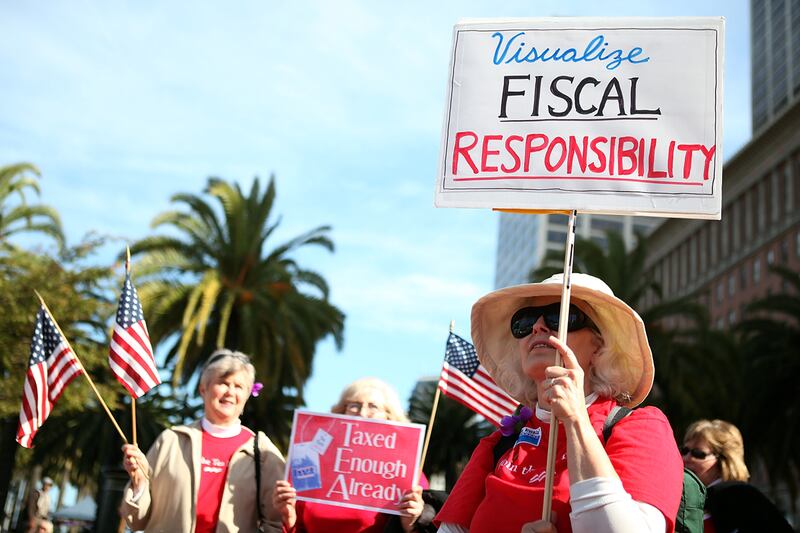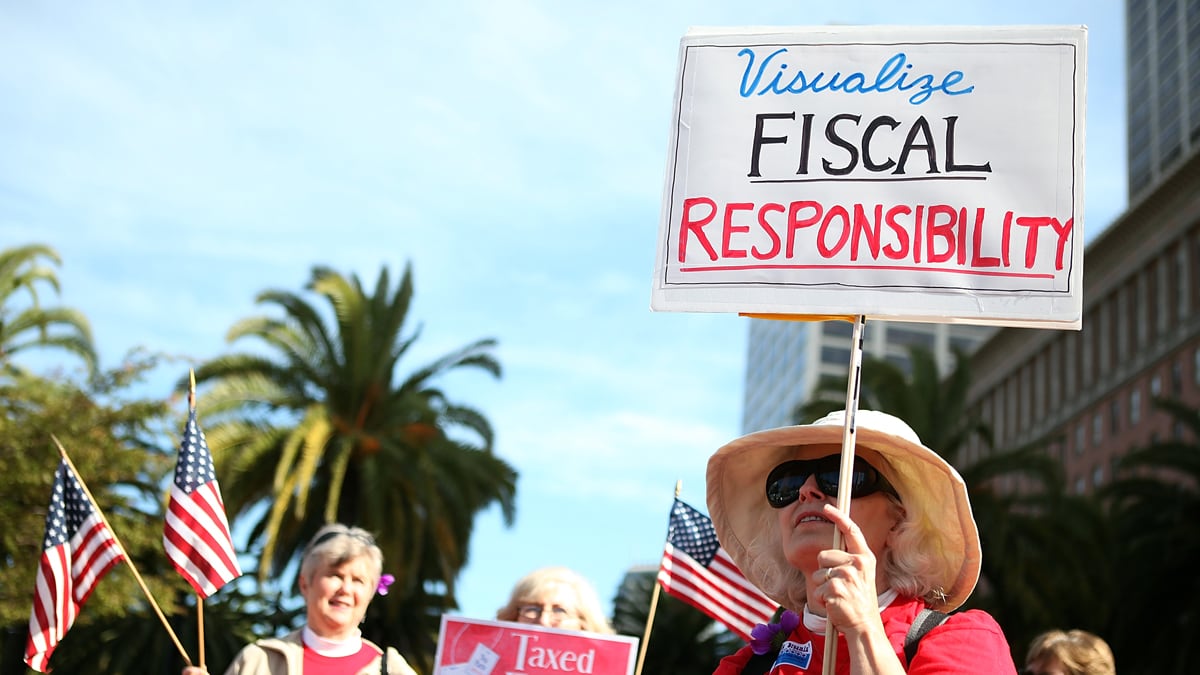For Tea Party activists, the day that members of Congress cast their votes on raising the nation’s debt ceiling will be a moment of truth, the point at which they find out who is with them and who is against them.
“We’re going to see if people really stay true to their principles,” says Mark Meckler, the cofounder of the Tea Party Patriots, one of the most influential of the organizations in the country. “Those who don’t will pay the price.”
With an Aug. 2 deadline for a possible default looming, Meckler’s group has insisted that members of Congress block any increase to the nation’s $14.3 trillion debt ceiling.
But a coalition of 130 other Tea Party groups, along with conservative powerhouses like FreedomWorks, the Christian Coalition, and the Club for Growth, are pushing a less restrictive, never-say-never approach for Republicans on the debt-ceiling debate.
“I think most of the members of our coalition believe that the debt ceiling should be raised, but only with substantial cuts, a cap on spending, and a balanced budget amendment,” says Alex Cortes, executive director of Let Freedom Ring. Cortes’s conservative grassroots organization has been at the center of “Cut, Cap, and Balance,” the budget-slashing online pledge that has quickly become congressional Republicans’ de facto position on how to get a Tea Party blessing for busting the budget without blowing up global financial markets in the process.
The mixed messages on the debt vote are the first major split within the sprawling Tea Party movement since last year, when millions of mad-as-hell voters sent a brigade of tax-cutting, freedom-loving Republicans to Washington with the mission of fundamentally changing the federal government’s size and scope. Not since George H.W. Bush broke his “read my lips” pledge against raising taxes in 1990 has there been such a stark showdown.
Cortes says the two Tea Party positions are not mutually exclusive, and Meckler says he agrees, to a point.

“We would love to see Cut, Cap, and Balance, but those promises are false,” he says. “They can fudge those numbers.”
The numbers in question are the dollars lawmakers would promise to cut out of the $3.7 trillion federal budget to reduce the national deficit permanently; the spending caps that would put the U.S. “on a path to a balanced budget”; and, finally, the mandate of a balanced-budget amendment to the Constitution, which also would require a congressional super-majority to raise taxes.
Meckler likes the goals, he says, but trusting Congress to live up to its promises is a fool’s errand: “Why would anybody believe what Congress says?”
Even the organizers of the pledge are hard-pressed to provide details about how it would work. They have yet to say whether the balanced-budget amendment is just a goal or a prerequisite for raising the debt ceiling—a crucial distinction.
But the lack of specificity hasn’t hurt the pledge’s popularity; in fact, it may have helped. Six presidential candidates (including Mitt Romney, Tim Pawlenty, and Newt Gingrich) have signed on, along with dozens of members of Congress who are looking for a message to get behind, or just looking for cover from Tea Party activists before facing possible primaries of their own.
Conversations with GOP senators on Capitol Hill revealed that there is no question that these activists are having an outsize influence on the GOP’s no-tax-no-way-no-how position in the debt ceiling talks.
“I think it’s ratcheted up the pressure,” says freshman Sen. Pat Toomey (R-Pa.) of Tea Party members’ influence on the debt talks. “And quite rightly because obviously we need that around here.”
But which Tea Party activists have Washington’s ear is the overriding question. And the answer, so far, is the more moderate Cut, Cap, and Balance crowd.
“Most of the Tea Party people I talk to are very supportive of the pledge,” says Sen. Mike Lee, a freshman Republican from Utah who swept into office last year with significant backing from the activists. “They understand that there is no political will to just let the debt limit expire and have an abrupt halt right now.”
In interviews with The Daily Beast, Lee and Sen. John Cornyn of Texas, the GOP’s point man on 2012 Senate elections, said that while no Republican will entertain raising taxes as part of the debt talks, they know of no Republican senators who are refusing to consider raising the debt limit under any circumstances, as the Tea Party Patriots are demanding.
“I don’t know anybody in the category,” Cornyn says.
“Our point is that if in fact we can do something that gets us on a path toward a balanced budget—like a balanced-budget amendment, spending caps, and entitlement reforms—that’s the way to address [Tea Party] concerns.”
For Republican senators up for reelection in 2012, addressing those concerns is vitally important as they scramble to avoid challenges from their right flank in next year’s primaries.
Orrin Hatch, who saw his fellow GOP senator in Utah, Bob Bennett, ousted by Mike Lee, introduced a balanced-budget amendment this week, as he has for years. But one amendment and a top slot on the tax-writing Finance Committee may not be enough to ward off a challenge from Rep. Jason Chaffetz, a GOP sophomore in the House who remains a Tea Party favorite in Utah.
On the debt vote, Hatch is standing firm, but not intransigent. “Right now I’m not supportive of raising it, that’s for sure,” he told me. “There would have to be some mighty big changes before I could support raising the debt limit.”
Meckler of the Tea Party Patriots says he is happy with most of the tough talk he’s hearing from Republicans in Washington but adds, “The problem is, will they hold the line?”
Update: Alex Cortes' quote was amended after initial publication.





